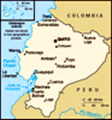Advertisement
Published: August 7th 2007
Disclaimer: This entry is less on my travels and more my thoughts and musings. Consider yourself informed.
Getting to work at the Centro for Recuperative Nutrition was like getting to work at a live-in WIC clinic. Great career experience (plus we were indoors with AC, could I ask for anything better?) and it also gave me the opportunity to put to use some of my dietary advice for hypertension and anemia more-so than when working with the other populations because there seemed to be a greater awareness of their dietary correlations. Still, it is frustrating trying to explain to many people that their conceptions about anemia are inaccurate. Most individuals just want to receive something, though I don’t think even they know what it is they want. As a result, most put down anemia as a current medical condition even though they clearly aren’t. I think this may be the result of anemia being such a well-known diagnosis that people because they have it if they have anything wrong with them at all; also compounding the problem is that there also seems to be the belief that unless they have a laundry list of complaints and illnesses they won’t receive

 Triage Photo
Triage Photo
We sure do love these group photos!the attention and care that one would receive if they just wanted an general health-checkup (quite the contrary! It would be more efficient to check over-all health than try to locate the origin of an illness that doesn’t exist!).
Overall, though, triage went smoothly and it really began to feel routine. Thus, without anything to vent about, I don’t have much more to say on that matter.
Back at the hotel, however, things take a different turn. After four days we finally get some hot water working—long enough for one shower. Still, even if I was made of soap and the very embodiment of cleanliness I wouldn’t have passed up this opportunity. It’s also brought to our attention that this hotel has no spare key to our room. Learning this the hard way after locking our key in the room, they try every spare key there is on the property (one even labeled for our room—no luck) then try breaking down the screen (which, to be fair, wasn’t doing much screening to begin with) in attempts to unlock the door with a broom handle. This goes on for quite some time. If it wasn’t for the contortionist abilities
of one of our teammates, who impressively squeezed through a 12” x 12” space in the cast-iron window grate into the room to unlock it from the inside, I might still be sitting in the hotel courtyard. Better yet, when we later forgot to leave our key at the front desk for cleaning during the day, they chastised us for having to break through the window again to gain access! I really do not see how it is our fault they don’t have a spare key to a room in their own hotel….but that’s just me.
For the first time since our arrival, several of us decided to leave the hotel and find dinner elsewhere in town. While the food itself hasn’t been bad (the sometimes tasty, sometimes eye-brow raising “question mark soup”, white rice, steamed vegetables, some sort of meat) it has been routine, and I get bored eating the same foods over and over, eventually leading to me just not eating it, leading to me losing weight and not having much energy. Ergo, off to dinner we went. It was at dinner that I shared for the first time a metaphor I’ve been working on for a
while. I started thinking of it earlier this summer in anticipation of my travels, and for reasons I now forget, shared it at this meal. It later became the subject of many convivial jests in my direction, so seems fitting to share here.
It started with my post-trip dissapointment in what I percieved to be lack of culture--Americana seems so droll and mundane in comparison to age old traditions that go back generations. But that's not to discount the very American-ness that makes us citizens either exalted, loathed or (more often than not) something in between. American History books always argue for one of two metaphors: America as a homogenous melting pot or America as a tossed-salad. I'd like to profer up the notion that it's a large salad smothered in a very rich salad dressing. Our beloved Ranch, if you will, representative of all that American culture--materialism, consumerism, coorperate culture and evangelicism. Each bite does indeed have that ubiquitous taste of onion and garlic, but you can still discern quite easily between a carrot, a cumcumber or a sunflower seed, the various social factions that, although individual and unique when set apart, come together to create a larger "salad" of American, and thank goodness you can because while there are those who would prefer dipping their spoon into a big gob of dressing and forgoing the diversity of vegetables altogether, I would like to remind them that this practice is extremely unhealthy (both literally and figuratively).
Now if, at the end of hearing this metaphor, you are like most of the individuals with whom I have shared it, you will be thinking not about its truth, or relevance or inaccuracy. Instead, your first immediate question will be “Who are the sunflower seeds?”
When this question was first proposed, I admit I didn’t know. I hadn’t thought it through in such great depth. Luckily, time has allowed me to ponder over this in some detail and now I feel prepared to offer my response. It would be simple to jump to the conclusion that each salad ingredient would represent the various ethic factions that compromise the United States. You could think, “Who eats sunflower seeds? Maybe people from Kansas; it’s their state flower after all!” But upon further consideration I realize that categorizing ingredients as ethnicities would wash-out the individuality that each person brings to the country, regardless of cultural background. If you wanted to get really specific, you may be able to categorize each micronutrient as a ethnic category, maybe the Irish are Vitamin K, the various Hispanic immigrants could be amino-acids….and they all come together to form these “foods” representing social networks and cliques what with a protein-matrix and carbohydrate complex and I don’t know. That requires far too much thought and this is my metaphor so disregard that and bear with me.
So we have these different components of the salad—cucumber, tomato, carrot and of course the sun-flower seeds—representing different social (not ethnic!) groups with similar ideals and attitudes and personalities which come together to form the larger entity that is the United States. Very well. Who are the sunflower seeds?
First we must take into consideration that sunflower seeds can stand alone outside a salad. Apart, with their hard exterior shell they are hardly palatable except maybe to birds and squirrels and the occasional base-ball fan who most of his time trying to get to his snack then watching the game. So sunflower seeds must take some work. These are not people who are immediately open and welcoming; you don’t get to know a sunflower seed upon arrival. In fact, looks are likely to be very deceiving because inside that dark hard shell is of course the nutrient rich, soft yet crunchy little snack that so many know and love. Second, not everyone likes sunflowers seeds on their salad. It’s strongly a matter of personal taste. Now I know that not everyone is going to like carrots, or tomatoes or a hard-boiled egg either—but by and large those are generally accepted as common salad constituents. Sunflower seeds on the other hand? You’re going to be getting some raised eyebrows depending on who you’re asking. Either you love them and your eyes light up when you see sunflower seeds at the end of the salad bar, or hate them and can’t imagine why anyone would ruin such a perfectly good meal with such an annoying little food. Likewise, it stands to reason that the personalities of sunflower seeds will draw strong reactions either negatively or positively. You just can’t be apathetic to a sunflower seed!
They add flavor, and crunch. They don’t absorb the ranch dressing like so many of their counterparts but are happy to be coated lightly in it. They stand alone or make popular assemblages with salads and other trail mixes. And they’re easily overlooked, and at the same time have a loyal fan base. They contribute to society in their own unique way, one which isn’t universally appreciated but by a select few.
I could be a sun-flower seed. Chances are if your first reaction to my metaphor was to ask me about sunflower seeds, you could be one too.
So there you have it; musings from the equator. This trip has given me the time to consider things I’ve long stopped considering.
Advertisement
Tot: 0.262s; Tpl: 0.013s; cc: 24; qc: 118; dbt: 0.1438s; 1; m:domysql w:travelblog (10.17.0.13); sld: 1;
; mem: 1.4mb













